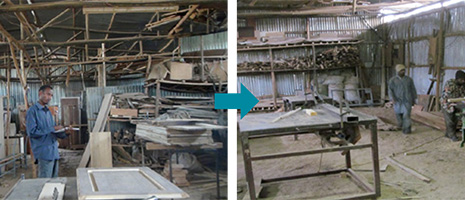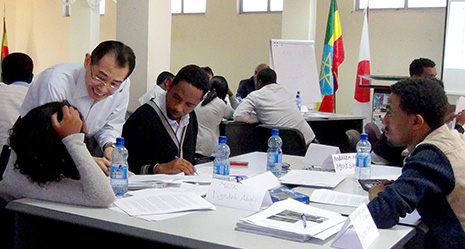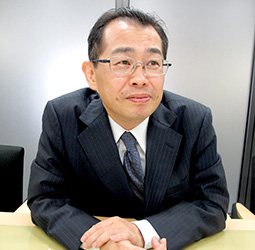Home > Highlighting JAPAN >Highlighting Japan July 2016>Japan and Africa: Partners for Growth
Highlighting JAPAN


Kaizen Never Ends
The Japanese business philosophy of “kaizen” is gradually and systematically taking hold in Africa, with Ethiopia leading the way.
“Kaizen” is a Japanese word originally meaning simply “improve to a better state.” The term now refers to activities to improve quality and productivity at a production site, and it is widely used in countries beyond Japan. Kaizen emerged out of the ingenuity of Japanese workers during the tough economic conditions that prevailed in the wake of World War II. One example is 5S, a practice of keeping things organized and set in order in factories and offices. Because kaizen can be introduced without significant capital investment, it has spread throughout manufacturing, and become a driving force for Japan’s strong economic growth. When Japanese companies that had entered the global market began successfully introducing kaizen to their overseas plants from the 1980s, foreign companies followed suit.
A leading example of the introduction of kaizen in Africa is in Ethiopia. In recent years, the country has been achieving remarkable economic growth, with real GDP growth around 10% for the past several years. The leading industries in Ethiopia are agriculture and services, but the Ethiopian government is now focusing on bolstering its competitiveness in manufacturing in order to achieve sustainable economic development. The Ethiopian Kaizen Institute (EKI), a government agency, is playing a role in this strategy, with the late Prime Minister Meles Zenawi having been influential in promoting kaizen. During a conference held in the capital Addis Ababa in 2008, Meles heard about the Kaizen Project to be carried out by the Japan International Cooperation Agency (JICA) in Tunisia, and immediately requested Japan’s support. In response, JICA commenced the Study on Quality and Productivity Improvements, with the trial introduction of kaizen carried out in pilot companies in 2009. In 2011, the Project on Capacity Building for the Dissemination of Quality and Productivity Improvement (Kaizen) commenced. In support, the Ethiopian government established the current EKI as the core organization for introducing kaizen to private companies. Since then, EKI has been working with JICA to promote kaizen.
One of the key roles played by EKI is to develop consultants who work for EKI and teach kaizen to companies.
“The number of people who underwent training at EKI and have become kaizen consultants already exceeds 100. Ethiopia has become the most advanced kaizen nation in Africa,” says Takeshi Fujita of the Japan Productivity Center.
Fujita supports EKI as a member of JICA’s Project on Capacity Development for Kaizen Implementation for Quality and Productivity Improvement and Competitiveness Enhancement, which was launched in 2015.
Under this project, consultants who have undergone kaizen training accompany Japanese experts at the pilot companies and propose kaizen measures to resolve the issues identified in the workshop. This includes adoption of the practice of keeping things tidy and in order in the plant, layout changes to make the workflow more efficient, and the elimination of unnecessary work. They also work to reduce the number of defective products through the introduction or revision of work standards, while reducing the breakdown of machine and equipment through effective maintenance activities.
While Japanese experts and local consultants provide support for the implementation of kaizen activities, the main role should be played by the companies. How will the experts and consultants find the root causes at the production site, and how can they propose effective improvement measures? If they can do this, companies will be persuaded and work seriously on kaizen. If employees at the site play a leading role in kaizen activities, this will produce greater effects and make it easy to continue. In the Ethiopian project, many plants achieved results through kaizen activities, such as reduced manufacturing costs, shorter work hours and decreases in the number of defective products.
“Based on our kaizen proposals, some companies think independently and carry out their own kaizen activities. It is a delightful surprise,” says Fujita.
Fujita also participates in JICA’s Project on Human Resource Development for Industrial Development. Of JICA’s kaizen-related projects for the manufacturing industry in African countries, this is the only project that aims to introduce kaizen to the areas of marketing, sales and financial management.
“To improve business results, it is necessary not only to improve quality and production, but also to upgrade the level of overall management. I would like to make the project in Kenya succeed so as to help the African manufacturing industry achieve rapid growth,” says Fujita, who spends most of each year in Ethiopia and Kenya. “Kaizen involves activities that are carried out by all employees of the company. Although I am in the position of training the local staff, I learn a lot from them every day.”
© 2009 Cabinet Office, Government of Japan







